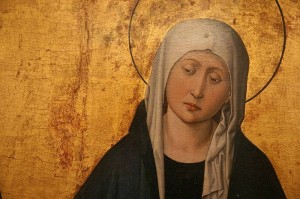 Scripture reveals that Mary, the Mother of Jesus, stood by the cross as her son died. This was foretold by Simeon in the Temple when Jesus was presented there. Hence, this feast acknowledges Mary as a martyr because of the intense pain of the sword piercing her heart. As you would expect, how could a mother not be with her son as he died? Her humanity was closely united to that of his.
Scripture reveals that Mary, the Mother of Jesus, stood by the cross as her son died. This was foretold by Simeon in the Temple when Jesus was presented there. Hence, this feast acknowledges Mary as a martyr because of the intense pain of the sword piercing her heart. As you would expect, how could a mother not be with her son as he died? Her humanity was closely united to that of his.
Your lectio may lead you to pray with the following: Mark 15:22; John 19:18, 25-27; Mark 15:34; Luke 23:46
Grasping the seriousness of this event gave way to the incredible composition of the sequence of Stabat Mater. Most parishes don’t sing this poetic text any longer but it used to be sung on this feast day and on Good Friday. Sometimes you’d hear it at the Stations of the Cross.
If you are not familiar with the rosary devotion of Seven Sorrows of Mary you will want to visit this site. This devotion has its roots in the 12th century and was made extraordinarily popular in the 13th. People like Saints Anselm and Bernard advocated this form of the rosary; the Benedictines, Cistercians and then the Servite friars took up the devotion to the Seven Sorrows of Mary. The feast of Our Lady of Sorrows was placed on the Roman Calendar by Pope Benedict XIII in 1727 and observed on the Friday prior to Palm Sunday; at the revision of the liturgical calendar the feast moved to this date. But the feast does have a variety of observances in other parts of the Church.
This is yet another truly Benedictine feast as it draws us to the foot of the cross. Given yesterday’s feast of the Exaltation of the Cross, today gives us the perspective of the mother. Mary’s sorrows have become our own sorrows; this is a reasonable feast that recognizes as concrete the place of sorrow in our experience. But sorrow is not the final chapter in this life: sorrow gives way to peace and joy. I am thinking of the mothers who have lost a child to all sorts of circumstances (sudden death, miscarriage, addictions, murder, war, abortion). Saint Benedict and his sons and daughters help to point the way to salvation in Christ through the cross.
The great Cistercian abbot Saint Bernard directs our thoughts and prayer in the following homily.
The martyrdom of the Virgin is set forth both in the prophecy of Simeon and in the actual story of our Lord’s passion. The holy old man said of the infant Jesus: He has been established as a sign which will be contradicted. He went on to say to Mary: And your own heart will be pierced by a sword.
Truly, O blessed Mother, a sword has pierced your heart. For only by passing through your heart could the sword enter the flesh of your Son. Indeed, after your Jesus – who belongs to everyone, but is especially yours – gave up his life, the cruel spear, which was not withheld from his lifeless body, tore open his side. Clearly it did not touch his soul and could not harm him, but it did pierce your heart. For surely his soul was no longer there, but yours could not be torn away. Thus the violence of sorrow has cut through your heart, and we rightly call you more than martyr, since the effect of compassion in you has gone beyond the endurance of physical suffering.
Or were those words, Woman, behold your Son, not more than a word to you, truly piercing your heart, cutting through to the division between soul and spirit? What an exchange! John is given to you in place of Jesus, the servant in place of the Lord, the disciple in place of the master; the son of Zebedee replaces the Son of God, a mere man replaces God himself. How could these words not pierce your most loving heart, when the mere remembrance of them breaks ours, hearts of iron and stone though they are!
Do not be surprised, brothers, that Mary is said to be a martyr in spirit. Let him be surprised who does not remember the words of Paul, that one of the greatest crimes of the Gentiles was that they were without love. That was far from the heart of Mary; let it be far from her servants.
Perhaps someone will say: “Had she not known before that he would not die?” Undoubtedly. “Did she not expect him to rise again at once?” Surely. “And still she grieved over her crucified Son?” Intensely. Who are you and what is the source of your wisdom that you are more surprised at the compassion of Mary than at the passion of Mary’s Son? For if he could die in body, could she not die with him in spirit? He died in body through a love greater than anyone had known. She died in spirit through a love unlike any other since his.